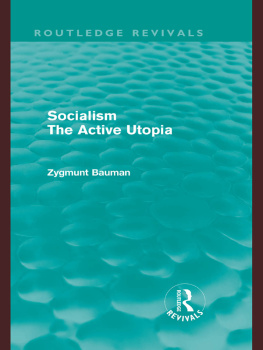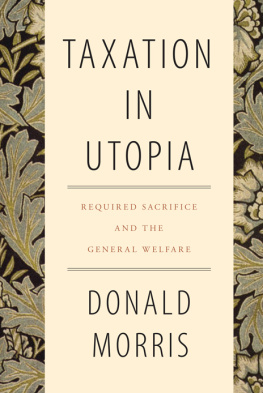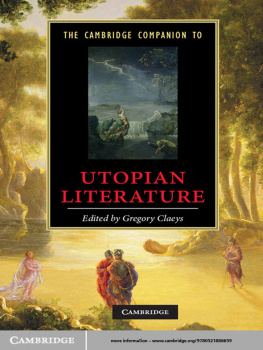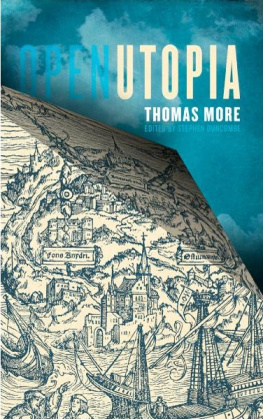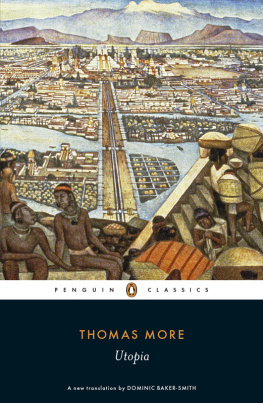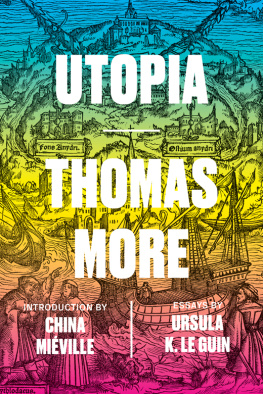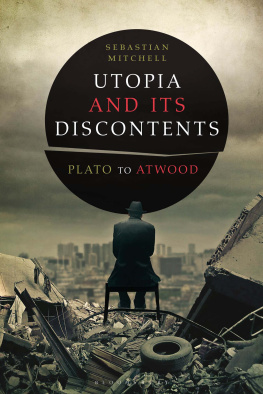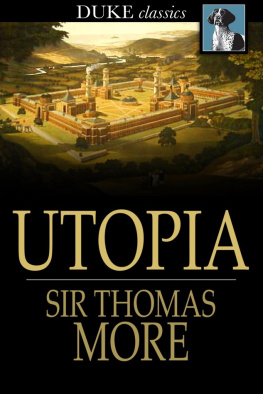
ADVISORY EDITOR: BETTY RADICE
UTOPIA
SIR THOMAS MORE, also SAINT THOMAS MORE, was born in London in 1477 or 1478. He was a page in the household of Cardinal Morton, who sent him to Oxford, and was called to the bar, where he was eminently successful. He became an MP and Under-Sheriff of London, and while envoy to Flanders began writing Utopia in Latin, finishing it in 1516. He was appointed privy councillor of Henry VIII in 1518 and, recommended by Wolsey, was elected Speaker of the House of Commons in 1523. On the fall of Wolsey he succeeded against his will as Lord Chancellor of England, the first layman to hold the office. He came into conflict with the King by refusing to acknowledge the sovereign as sole head of the Church, and in 1532 he resigned. Charged with high treason, he steadfastly refused to take an oath impugning the popes authority or upholding Henry VIIIs divorce from Catherine of Aragon. During his imprisonment he prepared a Dialogue of Comfort against Tribulation. He was beheaded in 1535; his canonization occurred four hundred years later.
A friend of Erasmus, Colet and Lyly and pupil of Linacre and Grocyn, More was internationally admired and respected as a man and a scholar. He was author also of the Life of John Picus, Earl of Mirandula and of the History of Richard III.
PAUL TURNER was born in 1917, and educated at Winchester and Kings College, Cambridge. He served in the RNVR (air branch) during the war, and then taught English literature at London, Cambridge and Ankara universities, before joining the Oxford English Faculty in 1964. He is now an Emeritus Fellow of Linacre College, Oxford. He has published a volume on the Victorians in the Oxford History of English Literature, and his translations from Greek, Latin and German include Longus Daphnis and Chloe, Lucians Satirical Sketches, Ovids Art of Love, Hoffmanns The Kings Bride and Fouqus Undine. His critical biography of Thomas Hardy came out in 1998, and his edition of Robert Brownings Aristophanes Apology in 2001. In 2002 he was made an MBE. He is now editing Brownings version of Aeschylus Agamemnon.
THOMAS MORE
Utopia
Translated with an Introduction and Notes by
PAUL TURNER
PENGUIN BOOKS
PENGUIN BOOKS
Published by the Penguin Group
Penguin Books Ltd, 80 Strand, London WC2R 0RL, England
Penguin Putnam Inc., 375 Hudson Street, New York, New York 10014, USA
Penguin Books Australia Ltd, 250 Camberwell Road, Camberwell, Victoria 3124, Australia
Penguin Books Canada Ltd, 10 Alcorn Avenue, Toronto, Ontario, Canada M4V 3B2
Penguin Books India (P) Ltd, 11, Community Centre, Panchsheel Park, New Delhi 110 017, India
Penguin Books (NZ) Ltd, Cnr Rosedale and Airborne Roads, Albany, Auckland, New Zealand
Penguin Books (South Africa) (Pty) Ltd, 24 Sturdee Avenue, Rosebank 2196, South Africa
Penguin Books Ltd, Registered Offices: 80 Strand, London WC2R 0RL, England
www.penguin.com
This translation first published 1965
Reissued with new and updated editorial material 2003
1
Copyright Paul Turner, 1965, 2003
All rights reserved
The moral right of the translator has been asserted
Except in the United States of America, this book is sold subject
to the condition that it shall not, by way of trade or otherwise, be lent,
re-sold, hired out, or otherwise circulated without the publishers
prior consent in any form of binding or cover other than that in
which it is published and without a similar condition including this
condition being imposed on the subsequent purchaser
EISBN: 9780141901657
Contents
Chronology
1477/8 Born in Milk Street, Cripplegate, London, eldest son of John More, then a barrister, and his wife Agnes, daughter of a Thomas Graunger, uncertainly identified as a wealthy merchant. Exact date of birth also uncertain: probably 6 or 7 February 1478.
c. 1485 Starts schooling, chiefly in Latin, at St Anthonys School, Threadneedle Street, London.
1490 Becomes a page at Lambeth Palace on the staff of Cardinal John Morton, Archbishop of Canterbury, Lord Chancellor of England, Chancellor of Oxford University (from 1494) and Henry VIIs right-hand man.
1492 Becomes a student at Canterbury College (and/or St Marys Hall), Oxford University.
1494 Begins studying law at New Inn, London.
1496 Enters Lincolns Inn.
c. 1499 Starts mixing with scholars interested in Greek literature, including William Grocyn and Thomas Linacre, who teach him Greek, and Desiderius Erasmus, who becomes a close friend.
c. 14991503 Lives in or near the London Charterhouse (Carthusian monastery) without taking any monastic vow.
1504 After brilliant success as a barrister, becomes an MP (constituency unknown).
1505 Marries Jane Colt, daughter of an Essex landowner. Moves into the Old Barge, Bucklersbury, off Cheapside, London; eldest daughter Margaret born.
15056 Erasmus stays at Mores house, and they work together on translating Lucian into Latin.
1509 Death of Henry VII, accession of Henry VIII.
1510 Becomes MP for London; appointed Under-Sheriff of the City.
1511 Death of first wife; marries Alice Middleton, widow of a London merchant.
1515 Travels (May) to Bruges as a member of an English mission to renegotiate treaties with the Netherlands. Visits Antwerp (July), where stays with the Town Clerk, Peter Gillis (Gilles), a friend of Erasmus. Returns to Bruges (September) and starts writing Utopia.
1516 Finishes Utopia in London: published in Louvain around December.
1517 Travels to Calais on another diplomatic mission; joins service of Henry VIII as Councillor Attendant.
1521 Appointed Under-Treasurer of the Exchequer, and given a knighthood.
1523 Becomes Speaker of the House of Commons. Supports Henry VIIIs controversy with Luther by writing Responsio ad Lutherum.
1524 Buys twenty-seven-acre estate in Chelsea and builds himself a large house there.
1525 Becomes Chancellor of the Duchy of Lancaster.
1529 Succeeds Wolsey as Lord Chancellor. Denies all subsequent statements by Protestants that he tortured people accused of heresy; but never conclusively cleared from suspicions of cruelty in pursuit of Church unity.
1530 Death of his father.
1531 Title of Supreme Head of the Church and Clergy of England adopted by Henry VIII, and reluctantly accepted by the Convocation of Canterbury with the qualification so far as the law of Christ allows.
1532 Resigns as Lord Chancellor, and returns to private life at his house in Chelsea, but continues a religious controversy with William Tyndale (translator of the Bible and Reformation leader).
1533 After the annulment of Henry VIIIs marriage to Catherine of Aragon, and his subsequent marriage to the already pregnant Anne Boleyn, More does not attend her coronation.
1534 Refuses to swear the oath required by the Act of Succession (in favour of Annes children) and is sent to the Tower, where he writes A Dialogue of Comfort Against Tribulation and undergoes five interrogations.
1535 Tried at Westminster Hall for treason in denying the Supremacy (of the King as Head of the Church). Condemned and beheaded on Tower Hill (reportedly making several jokes on the scaffold); his head impaled on London Bridge.
Next page

